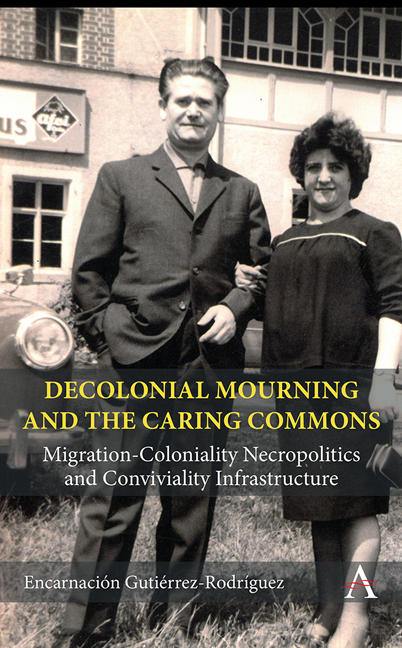 Decolonial Mourning and the Caring Commons
Decolonial Mourning and the Caring Commons Published online by Cambridge University Press: 29 February 2024
Introduction
This chapter focuses on the communal labor of mourning as political work against racist violence in Germany between the 1980s and the beginning of the millennium by naming, remembering and unraveling moments of antiracist resistance. Reconstructing some of the numerous acts of racist violence that have occurred in East and West Germany before and after the fall of the Berlin Wall in 1989, I listen to accounts of grief and resistance and bear witness to the communal political labor of mourning of the families, relatives and friends of those who lost their lives, as well as the activist network NSU Komplex auflösen (Unraveling the NSU Complex).
Initiating Memory
Until recently, the memory of racist attacks and murders that occurred in East and West Germany in the early 1980s had faded into oblivion. In the aftermath of the creation of the Tribunal NSU Komplex auflösen / Unraveling the NSU Complex (2017), initiatives memorializing racialized and migrantized persons who lost their lives in racist attacks were formed. These initiatives join other projects of remembrance of the victims of racist attacks in the 1990s and early 2000s. To follow, we will attend to their communal political labor of mourning.
Naming racist attacks: 1980s Western Germany
Postwar Western German society has been characterized by different migratory movements, from German refugees arriving immediately after WWII in Western Germany, fleeing from formey occupied territories in Eastern Europe to the systematic recruitment of Gastarbeiter from Turkey, Italy, Greece, Spain, Yugoslavia, Morocco, Tunisia and Portugal between 1955 and 1973 as well as miners and nurses from South Korea from the late 1950s onwards. During this time, the number of migrant workers from these countries increased from 280,000 in 1960 to 2.6 million in 1973. In the 1980s and 1990s, refugees, particularly from the former Yugoslavia, Afghanistan, Iran, Iraq and other countries of the Middle East, also arrived in Germany. The moderate increase of migrant workers in relation to the German population in the early 1980s was perceived as a threat to German society in public political debates. Fueling what came to be known as Ausländerfeindlichkeit (hostility to foreigners), the dominant political parties proposed curbing migration by restricting family reunification for migrant families. To this end, a reward scheme (Rückkehrprämien) was proposed for Gastarbeiter to hasten their return to their countries of origin in exchange for a lump sum of money (Thym 2018).
To save this book to your Kindle, first ensure [email protected] is added to your Approved Personal Document E-mail List under your Personal Document Settings on the Manage Your Content and Devices page of your Amazon account. Then enter the ‘name’ part of your Kindle email address below. Find out more about saving to your Kindle.
Note you can select to save to either the @free.kindle.com or @kindle.com variations. ‘@free.kindle.com’ emails are free but can only be saved to your device when it is connected to wi-fi. ‘@kindle.com’ emails can be delivered even when you are not connected to wi-fi, but note that service fees apply.
Find out more about the Kindle Personal Document Service.
To save content items to your account, please confirm that you agree to abide by our usage policies. If this is the first time you use this feature, you will be asked to authorise Cambridge Core to connect with your account. Find out more about saving content to Dropbox.
To save content items to your account, please confirm that you agree to abide by our usage policies. If this is the first time you use this feature, you will be asked to authorise Cambridge Core to connect with your account. Find out more about saving content to Google Drive.